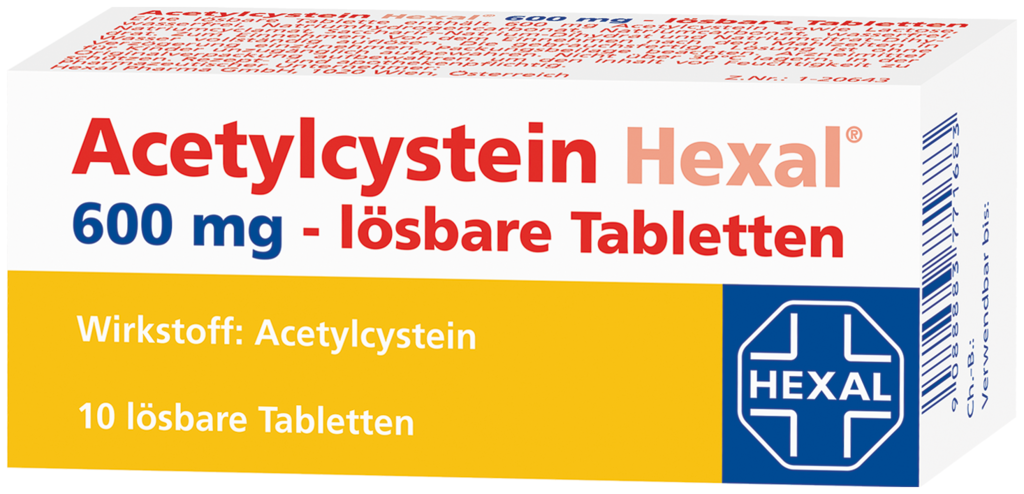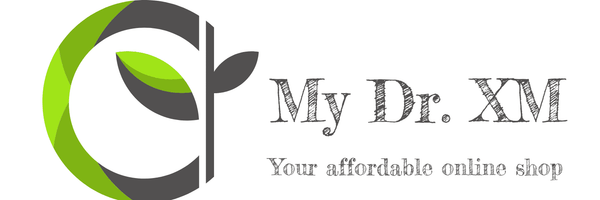Hexal
Hexal Acetylcysteine 600 mg - 10 dissolvable tablets
Hexal Acetylcysteine 600 mg - 10 dissolvable tablets
Couldn't load pickup availability
Acetylcysteine Hexal contains the active ingredient acetylcysteine, which has expectorant properties. Acetylcysteine has a specific effect on the components of mucus that make it thick.
Acetylcysteine Hexal liquefies viscous lung and nasal secretions. This promotes their expectoration, reduces the urge to cough and makes breathing easier.
Acetylcysteine, the active substance of Acetylcysteine Hexal, is made up of the body's own substances acetate and cysteine.
Acetylcysteine Hexal is used to dissolve mucus and to facilitate removal in acute and chronic respiratory diseases with thick mucus and reduced mucus transport.
If you don't feel better or feel worse after 4-5 days, contact your doctor.
Contraindications
Acetylcysteine Hexal must not be taken
- if you are allergic to acetylcysteine or any of the other ingredients of this medicine listed in section 6
- if you have a stomach ulcer
- of children and young people under 14 years of age
Interactions
Taking Acetylcysteine Hexal together with other medicines
Tell your doctor or pharmacist if you are taking/using any other medicines, have recently taken/used any other medicines or might take/use any other medicines.
Cough suppressants:
When acetylcysteine Hexal and cough suppressants (antitussives) are used in combination, a mucus-related blockage (“secretion build-up”) of the airways can occur due to the reduced cough reflex. Therefore, be sure to ask your doctor before combined treatment.
Cardiac medicines:
The simultaneous administration of acetylcysteine and nitroglycerin can possibly lead to low blood pressure (hypotension), which can be indicated by headaches. If your doctor considers co-treatment with nitroglycerin necessary, he or she will monitor you for any reduction in blood pressure that may occur.
Antibiotics:
For safety reasons, antibiotics should be taken separately and at least 2 hours apart.
Activated charcoal in high doses (as an antidote) can reduce the effectiveness of acetylcysteine.
Changes in the determination of laboratory parameters:
Acetylcysteine can influence the colorimetric determination of salicylates.
In urine tests, acetylcysteine can affect the results of ketone body determinations.
Dissolution of acetylcysteine formulations along with other drugs is not recommended.
Application
Always take this medicine exactly as your doctor or pharmacist has told you. Check with your doctor or pharmacist if you are unsure.
Unless otherwise prescribed by the doctor, the following dosage is recommended for Acetylcysteine Hexal 600 mg - soluble tablets:
Adults and young people aged 14 and over:
1 tablet once daily (corresponding to 600 mg acetylcysteine)
Acetylcysteine Hexal 600 mg - soluble tablets must not be used in children and young people under 14 years of age due to the high active ingredient content. Acetylcysteine Hexal 100 mg or 200 mg - dissolvable tablets are available for this age group.
Method of administration:
Oral use.
The tablet is taken after meals, dissolved in a glass of water. The ready-to-use solution should be taken without delay.
Duration of use:
For acute respiratory diseases, the treatment duration is generally 4 – 5 days.
Talk to your doctor or pharmacist if you have the impression that the effect of Acetylcysteine Hexal is too strong or too weak or if you do not feel better or even worse after 4 - 5 days.
Side effects
Like all medicines, this medicine can cause side effects, although not everyone gets them.
The frequency (likelihood of occurrence) of side effects is classified as follows:
Very common: may affect more than 1 in 10 people
Common: may affect up to 1 in 10 people
Uncommon: may affect up to 1 in 100 people
Rare: may affect up to Affects 1 in 1,000 people
Very rare: may affect up to 1 in 10,000 people
Not known: Frequency cannot be estimated from the available data
Most of the side effects of Acetylcysteine Hexal dissolvable tablets below are mild and temporary.
Uncommon: may affect up to 1 in 100 people
- Hypersensitivity reactions such as angioedema (allergic swelling of the skin and mucous membranes)
- Headache
- Ringing in the ears (tinnitus)
- rapid cardiac activity
- low blood pressure (hypotension)
- excessive nasal secretion
- Inflammation of the oral mucosa, abdominal pain, nausea, vomiting and diarrhea
- allergic reactions with itching, rash, hives and redness
- Fever
Rare: may affect up to 1 in 1,000 people
- sleepiness
- Difficulty breathing (dyspnea), shortness of breath due to narrowing of the airways; The rare documented cases of shortness of breath due to narrowing of the airways occurred primarily in particularly sensitive asthmatics. Coughing fits and shortness of breath may occur, which can trigger an attack in asthmatics.
- heartburn
- Convulsions, which can be fatal in the event of an overdose
Very rare: may affect up to 1 in 10,000 people
- Anemia, bleeding (were only observed in the context of a hypersensitivity reaction)
- allergic (hypersensitivity) reaction up to and including shock
- Bruise in the heart
- Bleeding (hemorrhage)
- Blistering of the skin and mucous membranes with severe general health problems (Stevens-Johnson syndrome and Lyell syndrome). If skin or mucous membrane abnormalities occur, you should consult a doctor immediately and stop using acetylcysteine.
Not known: Frequency cannot be estimated from the available data
- Swelling of the face (facial edema)
composition
The active ingredient is acetylcysteine.
One dissolvable tablet contains 600 mg of acetylcysteine.
The other ingredients are:
citric acid, anhydrous, sodium hydrogen carbonate, sodium carbonate, anhydrous, mannitol (E 421), lactose, anhydrous, ascorbic acid (vitamin C), sodium citrate, saccharin sodium, sodium cilamate, blackberry flavor (consisting of liquid wild berry and blackberry flavor, vanillin , maltodextrin, mannitol, gluconolactone, sorbitol, colloidal silicon dioxide)
Usually ships out within 3-4 business days
Share


